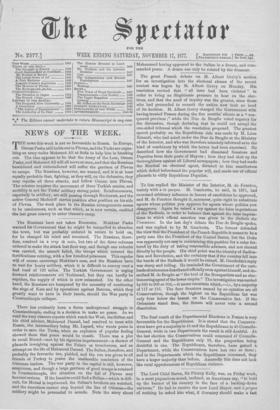To him replied the Minister of the Interior, M. do
Fourtou, mainly with a to quoque. M. Gambetta, he said, in 1871, had exercised arbitrary influence in favour of candidates he approved, and M. do Fourtou thought it, moreover, quite right to substitute agents whose politics you approve for agents whose politics you disapprove. Again he raised a cry against the false imputations of the Radicals, in order to balance that against the false imputa- tions to which official sanction was given in the Bulletin des Communes. In the last day's debate the Due de Broglie spoke, and was replied to by M. Gambetta. The former defended the view that the President of the French Republic is meant to be a party man like the President of the United States, but the Duke was apparently not easy in maintaining this position for a ruler fet- tered by the duty of taking responsible advisers, and not elected directly by the people. His chief point was the identity of Radica- lism and Revolution, and the certainty that if the country fell into the hands of the Radicals it would be ruined. M. Gambetta's reply was sharp and telling. He reminded the Government of the cart- loads of calumnies distributed officially even against himself, and de- scribed M. de Broglie as " the tool of the Bonapartists and an elec- tioneering agent of the lower empire." The investigation was carried by 320 to 203 or 204,—it seems uncertain which,—i.e., by a majority of 117 or 110. The four Senators named by co-optation are all Conservatives, though the highest on the Republican list was only four below the lowest on the Conservative list. If the Orleanists stand firm, the Senate will never vote a second dissolution.






































